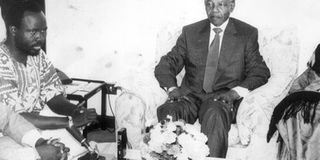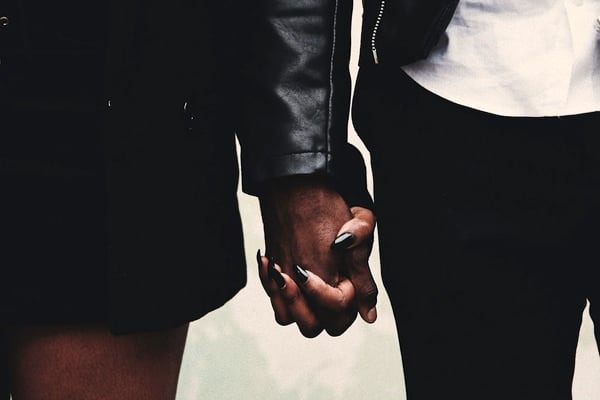An interview with Mandela changed my life - Wafula Oguttu

Wafula Oguttu (L) interviewed Madela. An interview that changed his life.
Phillip Oguttu Wafula, fondly known as Waf, is arguably one of East Africa’s most illustrious journalists. Born in 1952, the Bukholi County central MP went to Bukedi College, Kachonga and Teso College, Aloet for O’level and A’level respectively after which he attained a degree in Literature and Political economy from Beijing University in 1977, and a diploma in Chinese language from Beijing Language Institute among other post graduate qualifications.
He worked as a banking assistant with Bank of Uganda in 1973, book editor with Tanzania Publishing House, assistant lecturer at Makerere University from 1981-85, and chief editor of the Weekly Topic newspaper from 1985-92. He was to later found the Monitor newspaper with peers such as Charles Onyango Obbo and served as managing director and editor-in-chief from 1992-2004.
Any journalist would have staked his all to scoop an interview with Nelson Mandela. But for Wafula Oguttu, it was no big deal and business as usual. Even then, the interview in 1990, shortly after Mandela’s release from prison, has never left the Bukholi County MP the same as he shared with Ivan Okuda
The day was July 7, 1990. The assignment was an interview. The interview was with none other than global icon, Nelson Mandela at then Nile Mansions in Kampala. I was a senior editor with the defunct Weekly Topic newspaper and two of us [the other person was James Tumusime, then editor of the New Vision] were allowed to go and interview Nelson Mandela who was visiting the country, shortly after his release from Robben Island.
Fixing the appointment was not difficult since the people responsible were our friends, though I don’t recollect whom exactly we approached. What I remember is that the requirement was that the interviewer had to be a senior person, preferably an editor who was NRM-leaning and above all, a political journalist. Now, James and I were NRM 311 so we pretty much fulfilled the set standard. The interview was combined to save time so it was a kind of mini press conference.
How did I feel? Well, normal. I was not excited because naturally I am not easily excitable. I felt “Okay, Mandela is in town and James and I are going to interview him and his wife, Winnie”.
I did not take it as such a big deal but I felt it was a privilege because this is a person who had been condemned to life in prison and eventually the situation had changed and now he was a revered world leader and of course very famous. There was also Winnie Mandela. Actually at one time Winnie and Nelson Mandela were almost equal in popularity around the world.
I think that if Mandela did not have a wife like Winnie, his name would not have spread to the world as it did because Winnie carried on the struggle. Of course she carried the name Mandela but she was also very charismatic. So having the opportunity to interview them was such a privilege.
I might have talked to some colleagues like David Ouma, Kevin Aliro, Tebere, Charles Onyango Obbo, Bidandi Ssali, Kintu Musoke and Kirunda Kivejinja. I could have asked them for some questions before I went for the interview.
The interview was in the morning at around 11am. We go to a room, sit there and he walks in with the wife. We stood up, shook hands with him and said, “Welcome to Uganda,” and “Welcome back from Robben Island.” He replied in his nice voice, “Thank you, sit down.” He then said something about journalism and the role the media plays in fostering peace and justice in the world.
Expecting a radical man
At that time, I was a politically radical person because of the socialist and communist leaning, following my training from China. This particularly excited me because I was going to interview a person whom I thought was a Marxist and a person going to be a socialist in South Africa. I don’t remember who asked the first question or what it was about.
I knew my questions were going to be around what society, for instance, he was going to build in South Africa and to be honest I was disappointed a bit. I expected this radical person who was going to punish those who oppressed the blacks, make sure everything from the soldiery, police and economy was black – and he did not come out that way.
I expected this sweet Winnie voice, accompanied with a very tough man but I was talking to a man who is sort of dull, not forceful but he is firm, he is articulate and makes his point very softly. You come back as a journalist to get what he really means and he is firm. His version of South Africa after he had taken over was startling, impressively so. Here was Mandela saying he wants everybody to be okay, to stay in that country, to do what they have been doing, and put an end to racial discrimination. He stressed that there were some poor whites in his country and they too deserved a better rainbow nation. I was like “Wow!”
After that interview, I realised he was truly different, coming from Uganda under Museveni and Obote and the way they talked to us about liberation.
Obote taunted Ugandans for liberating them from Idi Amin and Museveni in every speech taunts us about how he killed his animal and sacrificed his family and life, but Mandela never talked about his 27- year struggle throughout the interview. He was like an ordinary person. He was actually even excluding himself from a potential presidency even when it was obvious no one could stand against him.
My goodness! The old man was simple and humble yet tough on what must be right. If you were in another room you would imagine we were talking to another ordinary old man. That is the Mandela we interviewed.
I don’t remember asking him a question that particularly excited or angered him but in the course of our conversation after the interview, we discussed the revolution and I insisted on the land and class question in South Africa. He laughed it off, realising my radical background and said, “We should not do things which are going to make people run away from South Africa. The land belongs to South Africans and whites are also South Africans.”
We did not ask Winnie any question because we thought the interview was for Mandela but we had a conversation with her later on her struggles for Mandela. I must admit I was very happy to see Winnie. She did great things if you look at the 1970s and 80s.
She did a lot of things for Nelson and I think it was unfair for him to divorce her. Personally if I was him I would have tolerated Winnie and stayed with her in the same house despite the differences. Winnie did wonders for Madiba.
Grateful to Uganda and Museveni
He was very grateful to Uganda and President Museveni because we hosted Africa National Congress forces here at a time they were getting more insecure in other parts of the continent.
However, I am sure Mandela would not want to visit Mr Museveni again because he has lost track. He was grateful to other great leaders of the time like Mwalimu Nyerere, Kwame and other pan Africanists.
We did not ask him personal questions because we felt that was not necessary, we knew he had been in jail, had this wife he left and of course we had heard about her but she was only a human being. We could have gone to the other stories that were going round, on his differences with Winnie but we were careful.
I asked where he was staying and he said, “In my old house in Soweto and Madizikela kept it for me.” He preferred calling her Madizikela, South Africans rarely use English names.
I wish I got another chance to interview him after retiring as president. I would have asked him why he did not talk to other African presidents to learn from him because he spent a chunk of his adult life in jail and here he came and left power after five years. All Africans who have come to power through revolutions have hung onto power.
I would have also asked him why he did not solve the land question because he had promised to build one million houses for slum dwellers in Soweto and Cape Town and I think those two unfulfilled promises are some of the things that make some South Africans disappointed in him, and those who did not understand his olive branch to the whites.
I used a small tape recorder for the interview and I was not even writing. The interview ran in the next issue of the newspaper and we doubled print copies because people wanted to read about Mandela.
No one saw bitterness in the interview. Readers were happy, I used to be a good interviewer, even with Museveni. I didn’t prepare many questions, I would ask one question and from his response follow up and get three more questions.
My lesson from Mandela interview
That interview and eventually what he achieved had a profound effect on me and it has shaped my entire life. I learnt to always be humble and that everybody deserves as good as you.
We heard stories about this boxer, “terrorist” and what-not but when he walked in, he had no stature. That humility and his heart of gold changed my life.




